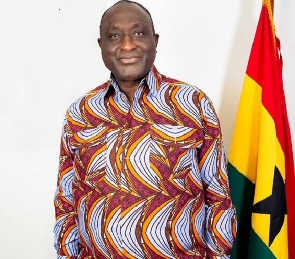Former Minister for Trade and Industry, Alan Kyerematen who has officially declared his intent to contest the NPP flagbearer race has said, he will become a transformational leader who will build on the foundations laid by successive leaders of the nation over the last 65 years.
To achieve this strategic goal of transforming the country to become the shining star of the new Africa, Mr Kyerematen said “I will as President, launch and lead the execution of the Great Transformational Plan (GTP) of Ghana which will span the period 2025 to 2030.”
He said the Post-COVID Economic Recovery Programme (P-CERP) currently being implemented with the anticipated support from the IMF from 2023 to 2025, will be a transitional economic programme leading to the roll out of his GTP.
Mr Kyerematen said these in a televised address to the nation on Tuesday, 10 January 2023.
He noted that the GTP will be anchored on the following key pillars:
A Strong Macroeconomic Environment: The success of the GTP will depend primarily on strong macroeconomic fundamentals, which will include among other things, a stable currency, low inflation, sustainable debt levels, revenue optimization and tight expenditure control to guarantee fiscal balance, low competitive interest rates, strong external reserves backed by high levels of liquidity to support the financial sector.
To a large extent, the IMF support programme when fully executed, will create the appropriate conditions that will underpin the Great Transformational Plan.
A New Agricultural Revolution (NAR) for Ghana: The NAR will be based on five critical elements.
I. Introducing Technology and Innovation into Agriculture, through Research & Development (R&D) in Agronomy, Mechanization, Irrigation, and Plantation Management. This will build on the foundation laid by the Planting for Food and Jobs and Planting for Export and Rural Development (PERD) Programmes. Our farmers cannot be competitive without technology and innovation.
II. The establishment of Licensed Food Distribution and Marketing companies by the Private Sector throughout the country at the district level, to be supported by the Government. These companies will constitute a vital link between farmers and Market Queens in the urban and peri-urban areas. It will be complemented by the introduction of a digitalized food distribution and marketing online platform which will connect producers to buyers and consumers.
III. The strengthening of the Ghana Commodity Exchange as the marketplace for all actors in the Agricultural value chain.
IV. Deepening the current regime for lending and financing for the agricultural sector.
V. Enhancing the de-regulation of the Cocoa sector by deepening private sector participation in the buying and marketing (including export) of Cocoa.
VI. Mass Citizens participation in Agriculture by introducing an ‘Operation Own a Farm’ programme for the Ghanaian citizenry in general.
Industrial Transformation: This will build on the successes of Government’s Ten Point Industrial Transformation Programme including the One District One Factory (1D1F) initiative; the establishment of Strategic Anchor Industries to diversify the economy beyond Cocoa and Gold e.g the Automobile assembly, Garment and Textiles, Pharmaceuticals and the Petrochemical industry; enhancing the growth and development of Small and Medium Enterprises; establishment of Industrial Parks and Special Economic Zones; and supporting Domestic Retail Trade and Distribution.
Accelerated Infrastructure Development: Promoting Private sector financing for public infrastructure such as Roads, Railways, Ports and Harbours, Water Supply Systems, Public Housing etc, which will reduce Government’s exposure to the financing of such infrastructure projects.
Digital Mainstreaming: Digitalization will be mainstreamed in all Government and Public sector activities, building on the current work led by the Ministry of Communication and Digitalization.
Energy Security and Diversification: Greater emphasis to be placed on developing renewable sources of energy, by fast-tracking the execution of Government’s energy transition strategy, including but not limited to nuclear and hydrogen energy.
Decarbonization and Climate Resilience: Scaling up Government’s current efforts at reducing Ghana’s carbon footprints and facilitating access to the carbon trading markets, as well as establishing mechanisms to strengthen the country’s preparedness against the negative effects of climate change.
National Security and Defence Optimization: Deploying resources to strengthen National Security and Defence Mechanisms and Infrastructure, to deal substantively with emerging security threats and challenges, particularly in the Sahalian region.
Downsizing Government: The architecture of Government will be overhauled by consolidating some existing Ministries, Departments and Agencies. This will mean running a lean Government structure that will ensure operational efficiency and effectiveness in the delivery of Government services.
Strategic Engagement with the International Community: Ghana’s diplomatic and economic relations with the International Community under the GTP will be predicated on the principle of ‘positive neutrality’, based on the strategic interests of Ghana, as well as our shared commitments for the preservation of peace around the world and respect for humanity.
The former minister further stated that he will in the next several months provide further details of his GTP in the new ‘Alan K Prime Time Talk Show’ to be introduced.
“I will also seek inputs from the people of Ghana as I go round in the regions and districts on my campaign tours,” he added.
General News of Wednesday, 11 January 2023
Source: classfmonline.com
I’ll become the transformational leader of our time if I'm voted President – Alan Kyerematen
Entertainment
















